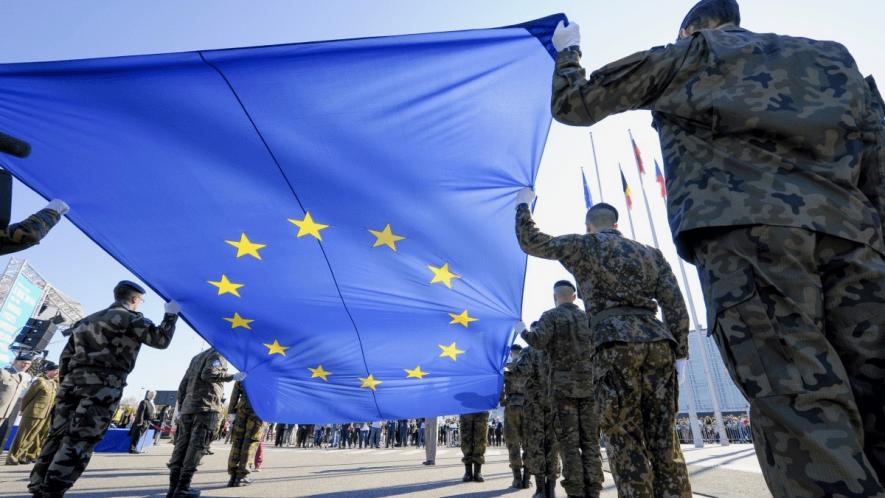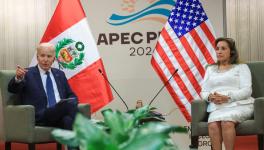German Imperialism & European Ambitions Beyond NATO

At a conference, “Contradictions within imperialist countries and the danger of war,” journalist Jörg Kronauer gave a presentation on German imperialism and its military ambitions. This is an excerpt of the presentation.
In this excerpt, we bring you his views on how German imperialism operates within the NATO alliance and within Europe. He also talks about PESCO or the Permanent Structured Cooperation.
The full video can be viewed here. Jörg Kronauer is a German journalist and author, and editor in chief at German Foreign Policy.
Germany’s army (Bundeswehr) is capable of supporting military missions but is too weak and has too little practical experience to constitute a threat, let alone carry out any mission on its own, for its own interests. Therefore, NATO is the alliance that is useful on a global level against great powers and at the moment, especially against Russia.
The ongoing conflict is the fight over who exerts influence in eastern Europe: the Germans or the Russians. This power struggle led to the escalation of the Ukraine conflict and it has not been decided unequivocally for the German/European or Western side, which increases the desire to expand the military pressure on Russia. It manifests itself in the leading role the German army is playing in building the NATO spearhead and stationing NATO troops in Eastern Europe. In this conflict with Russia, NATO is the ideal ally for the German establishment, because it gains access to the military weight of the United States.
US president Donald Trump’s threat to leave NATO or no longer participate in its activities unless the European countries, and especially Germany, pay its share is not so unusual. Any US government would insist on more money – some more discreetly, some more diplomatically than Trump – if NATO, with its operations in Eastern Europe, is helping to serve German interests against Russia. So, following the logic of imperialist hegemony, Germany should invest more in NATO.
And that proposal does not contradict the interests of the German elites, who for their part want to increase military spending anyway and can now say: We have to increase our contribution, our military spending, Trump demands it, we cannot do otherwise. It is no longer in their interest, however, that the United States determine the course of events, the pace and the direction of any military thrust. Within NATO, the strongest military power is also the strongest political power, in this case the United States. This in turn means that German elites have little influence on NATO but need to submit to the US interests within this alliance. German elites have been looking for alternatives at the European level.
But why do you need a second military alliance If you have a working one? For the ruling circles in Germany, it was Franz Josef Strauss (a right-wing politician) who formulated the position as early as the 1970s that Germany has its own military-political interests and, if necessary, should be able to conduct operations even if they do not correspond to the interests of the United States. This does not mean a war against the United States, but a war against the interests of the United States. For this scenario, Germany needs its own armed forces. At the current moment, there are still historical and legal obstacles to a strong, internationally active and independent Bundeswehr. Hence, a broader alliance would be beneficial. Thus, Germany is seeking this alliance within Europe through building an EU army.
A European Army has been a demand for 15 or 20 years now. Small steps have been taken in this direction, for example EU battle groups have been set up. So far, they have never been deployed because of the conflicting interests between the EU powers. Currently, the plan extends to build an army of Europeans including non-EU countries like Great Britain and Norway, which is a much stronger military power then generally assumed.
PESCO, the Permanent Structured Cooperation, of which 25 of 28 countries are members, as a strategy, is not to set about building large EU infrastructures that are then “filled” with soldiers. This approach wouldn’t work because ultimately, both Germany and France, as well as the other states, will not give up control of their own armed forces completely.
Hence, the strategy is to build this army of Europeans step by step from the bottom-up with small projects. For example, common ambulance trains or joint projects in the logistics sector are being set up or certain armament projects are being pushed forward. All this is taking place within the framework of PESCO, and it is unspectacular. No one reports on a German-Hungarian ambulance train. This does not cross the threshold to get into a major daily newspaper or the television news. But it is taking place! And in another 15 years, this army will be able to give Europeans a global and leading role.
Certain conditions are necessary for PESCO to work: Countries need to develop their defense capabilities, in particular, by participating in multinational equipment and armament programs, and armed forces must be made available within a certain period of time if necessary. Members of PESCO are countries such as Austria, which is officially neutral. PESCO actually works as a covert, permanent arms-buildup for the whole of Europe, and in the end, Germany is the beneficiary and will insist on a leading role.
And the so-called neutrality of Austria or the Nordic countries, as well as Ireland, Finland and Sweden, is worth nothing. Neutrality really is in the past. Countries taking part in PESCO, and that is de facto all of them, must be prepared to support the wars that will come – that’s the objective of this project. Germany is indeed the leader at PESCO, which causes friction between Germany and France, the two strongest powers in the EU. France is involved in PESCO, but does not play a leadership role. From the point of view of the ruling circles in France, wars are not in the future, they have existed continuously, most recently in Mali. France’s perspective is that while it is fine to have an army of Europeans in 10 years, by then, its armed forces will be completely exhausted or as the case may be, it will have to spend vast amounts of money. The French elites need a faster solution, for Mali, or its next mission in Africa. So, a second initiative exists at the EU level, alongside PESCO.
PESCO – being a German project – receives some attention within the German press at least, the second European Intervention Initiative, works differently and is not reported on at all as an actual deliberate project.
A dozen European countries are now participating, and they are not doing training like ambulance trains and joint armament projects. Instead, they orient their existing armed forces towards joint operations. What is already taking place today – such as joint situation analyses and at least thinking through joint deployment scenarios – is thus geared towards rapid joint deployment. The model for this is the war in Libya in 2011, which, with the support of the USA and the participation of other armed forces, was ultimately led primarily by France and Great Britain. And they did not set up a bilateral alliance for years to come, but quickly threw their lot together and learned how to wage war together in practice.
European imperialism is on the march and preparing for war. Anti-imperialist struggle needs to stop the creeping arms build-up in the European region.
Courtesy: Peoples Dispatch
Get the latest reports & analysis with people's perspective on Protests, movements & deep analytical videos, discussions of the current affairs in your Telegram app. Subscribe to NewsClick's Telegram channel & get Real-Time updates on stories, as they get published on our website.
























